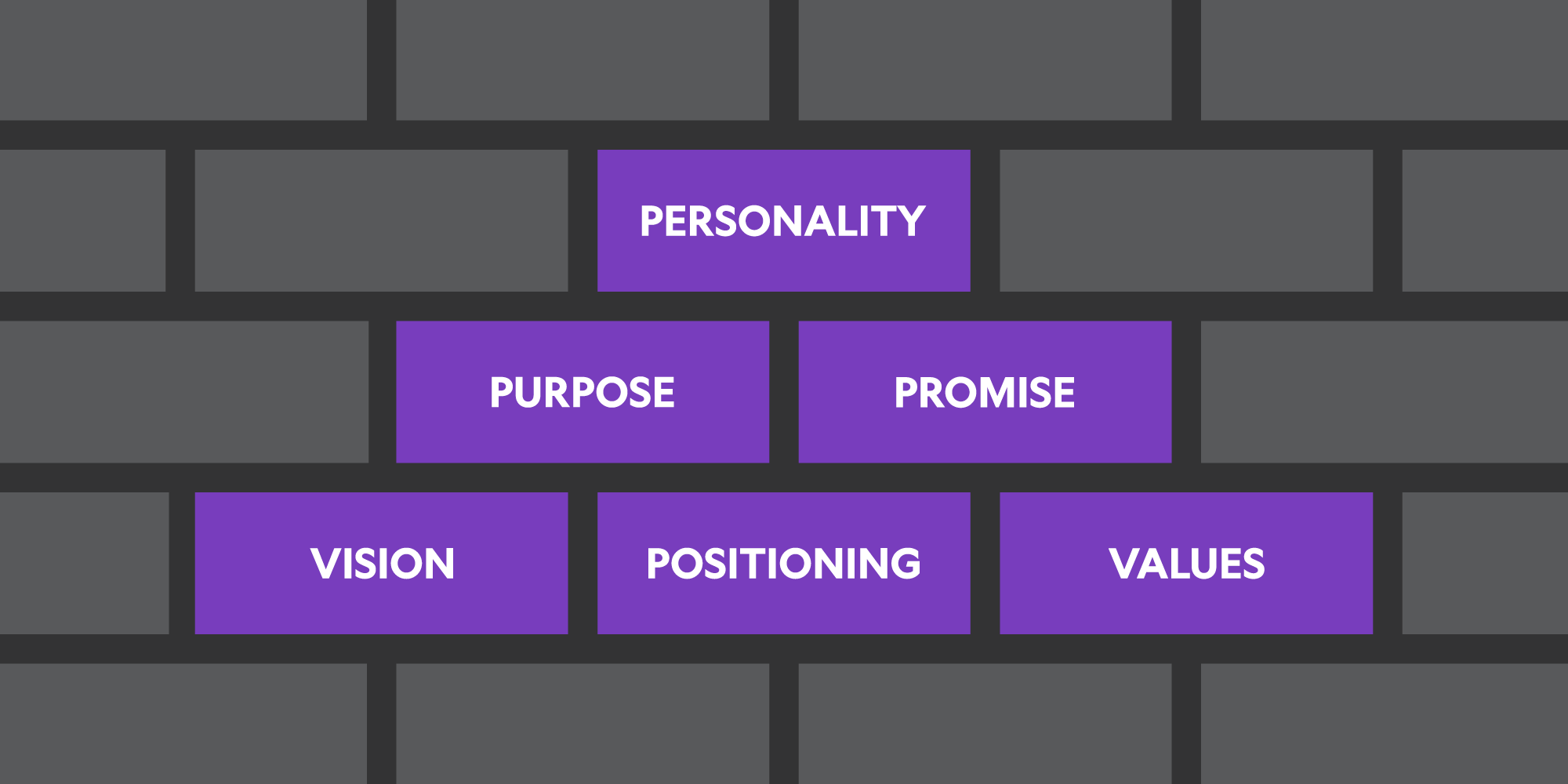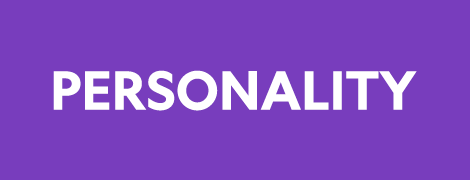What are Brand Foundations?
If we were building houses, we'd lay foundations. We do the same thing with brands; we don't want walls to collapse! The brand foundations make customers to feel something. We want to give them an unforgettable experience, that's packed with emotion. The Brand Foundations are your core principles. We outline these as follows:
- Your Purpose – why you exist beyond making money.
- Your Vision – a marker that tells you how to drive your brand forward.
- Your Values – these brand values influence culture, hiring, marketing, and customer experience.
- Your Personality – how do you define your tone of voice, language style, and emotional traits?
- Your Positioning – how you are placed in the market and what makes you different.
- Your Promise – your commitment to the customer and consistency of the experience.

These 6 foundations shape consumers' views of your business. Building perceptions and trust. Without brand foundations set, customers will struggle to:
- Understand why they should buy from you, and not a competitor.
- Trust the reputation you're growing.
- Be excited by the experience.
- Connect to your brand on an emotional level.
At the same time, getting staff excited about work will be hard, and there's a risk of a negative culture. We build brand foundations to move towards an identity that amplifies your you-ness.
6 core elements of a strong Brand Foundations
Like me, you want your brand to stand out! But building an effective brand is not easy. You and your staff need to make a daily effort to tackle problems and work on the brand foundations.
What goes into the brand foundations? What makes your business unique? Here are the six areas that set up a strong brand foundation and make your brand successful:

1. Define your Brand Purpose: The ‘why’ that drives you!
Your brand purpose is the perfect place to start your brand foundations. It's the reason your business exists, beyond making money. It answers the question: why do we do what we do?
Your brand purpose:
- Guides your decisions – like why do we choose 3-ply toilet roll in our customer bathroom?
- Motivates your team.
- Connects emotionally with your audience!
When you nail your purpose, you create loyalty. People will align with your brand if they share your values and ambitions. We've worked with clients whose purpose was to create a more peaceful world or raise money for mental health, or build healthier futures.
Consumers care about the businesses they support. If your purpose is authentic and well-communicated, it becomes an anchor. It grounds your brand even when the world gets a little wobbly. Whether you want to reduce waste, bring joy, or advocate for change, your purpose fuels long-term brand goals.
And when things get hard (because they will), your ‘why’ helps you reframe the tough stuff. You’ve most likely heard it takes 10,000 hours to master a skill. Well, purpose gives you the patience to show up for hour one... and every hour after that.
At Snapper Studio, our purpose is to create world-changing brands and to build a stronger, more collaborative world. That goal, that journey, is what gets us out of bed each day!
So, what's your why? Break it down. Make it feel doable. Start small. Keep showing up. It’s going to happen because you are going to make it happen.

2. Craft your Brand Vision: To inspire growth
Your brand vision is a statement that tells everyone where your brands going. It's the strategic direction for your brand foundations. Inspiring both internal teams and external audiences.
Your brand vision:
- Paints a picture of what success looks like – revenue, reputation, return on impact (ROI).
- Dictates boundaries for your teams.
A clear brand vision guides decisions over the next 10 years. It sets you goals like ours, to become Australia's top branding agency. It makes you break it down into itty-bitty chunks.
A good vision is something aspirational, specific, and emotionally driven. For example, “To become the most trusted eco-conscious skincare brand in Europe.” This one sentence, superpowers your brand, influencing products you sell. It also powers marketing campaigns, company culture, tone of voice and visual identity.

3. Define Brand Values: To build trust and culture
Your brand values are the beliefs and principles that guide your actions. They shape your brand foundations. They influence culture and hiring. They drive your marketing tone, and affect customer service.
For many business owners, brand values are a concept you hear about but don't know how to define or use. Meaning that defining the values get left on the ‘worlds-longest-to-do’ list.
Your brand values:
- Are your backbone principles, they reflect why you’re in the game, what you stand for and what you believe in. They inform every decision you make as a business.
- Are your non-negotiables in business. They are your principles that govern and inform everything you do and don't do.
- Align with who you are and what you value. When your operations reflect your beliefs, work feels meaningful, and makes a real impact.
- Affect your communications, marketing, decisions, and your relationships with customers, staff and suppliers.
Having well-constructed, clear values means you attract the right type of customers. Customers will align to your values. They will become superfans because they support what you’re trying to achieve.
When consistently lived out, brand values turn your business into a movement. Not a product or a service. Values are more than words on your website; you must action values daily to be meaningful.
In summary, aligned values = aligned customers = KER-CHING!

4. Develop a Brand Personality: To connect with customers
Your brand personality's job is to talk to the customers' problems in a way that engages them. Your customers are humans, so you need a humanised brand voice and personality. Forgetting these in your brand foundations, is like forgetting your morning coffee!
Your brand personality:
- Needs to be present at every touchpoint.
- Understands your customers' feelings, quirks, needs and wants.
- Must get into customers' brains and suck out as much useful information as possible.
- And, your brand voice needs to use their language.
Before you humanise your brand’s personality, you need a clear understanding of your customer and their challenges. Then can you explore their deeper psychological needs. Are current world events shaping how they feel? These shifts influence buying behaviour. Either way, knowing your audience is essential.
Here’s an example: I once attended an Anita Siek brand story masterclass. She said, “I bet you’ve got 30 tabs open on your browser right now? Close them all down.” That line grabbed everyone. I had at least 80 open. Observations like that make people feel seen. That’s the key to connecting them to your brand foundations.
Your brand personality should feel relatable, memorable, and emotionally engaging. A fun game I like to play in a strategy session is this:
- Imagine your brand is at a party, filled with ideal customers and a few competitors.
- Describe what they are like.
- What are they wearing?
- What drink do they order?
- What do they talk about? What are some phrases they always say?
- How do they approach people?
This game gives you a giggle and sets your tone. Are you cheeky and rebellious? Calm and empathetic? Being consistent is key in today's trust-driven economy. It also helps you avoid misssteps like an Astronomer at a Coldplay concert...
Distinctive brand personalities stand out and build stronger communities.

5. Use Brand Positioning: To own your Space in the Market
Brand positioning defines how your brand is uniquely placed in the minds of your ideal customers — especially in comparison to your competitors. It’s about what you offer, who you serve, and why you’re the best choice.
Your brand positioning:
- Communicates what you do, how you're different, and why it matters
- Gives internal clarity on your audience, pricing, messaging, and your Unique Selling Proposition (USP)
- Reflects your core strengths while aligning to customer needs
Without clear positioning, your brand risks blending in. Design your brand foundations to avoid this.
Your USPs are how you articulate why someone should choose you over everyone else. It could be your unique features, exceptional customer service, or your commitment to sustainability.
A USP is the headline of your positioning – it tells people why you're different and desirable.
Before crafting a marketing plan, launching a new website, or creating fresh content, you need a clear understanding of your brand foundations and your audience’s psychology. If you can finish the sentence “We specialise in...” in one breath, you’re almost there.
A strong USP reinforces your positioning and empowers your audience to connect with you on a deeper level. Building loyalty, not just brand awareness.

6. Deliver on your Brand Promise: To build lasting loyalty
Your brand promise is more than a tagline — it’s a clear, actionable commitment to your audience. It defines the experience customers should expect when they interact with your brand. A promise sits in the middle of trust-building and brand loyalty. Making it a vital part of your brand foundations.
Your brand promise should be:
- Authentic – reflecting what you actually do.
- Emotive – connect on an emotional level.
- Distinctive – different to competitors.
- Measurable – so your team can track if you're doing it.
If your brand promises “unmatched customer support,” then every interaction must reflect that. From your onboarding emails to your help desk experience. When your operations and messaging align with your promise, customers rely on you. This strengthens loyalty and encourages advocacy.
A brand promise is a standard woven into all your operations, culture and messaging. If you need to build one, answer the following:
- What do you guarantee?
- What emotional outcome do you want to create? How do you want people to feel?
- What makes us worthy of trust?
Pro tip: Align your brand promise with your culture and messaging. A broken promise is worse than no promise at all.
Authenticity is everything. When it's clear, believable and achievable, your brand promise becomes your most powerful message!
Get these 6 steps right, and you'll have some cracking brand foundations.
Brand Foundation Checklist: Are you missing anything?
Building strong brand foundations isn’t just a checkbox exercise, but it is a checklist. Use this practical checklist to ensure your brand has a great foundation.
1. Brand Purpose
✅ Have you defined why your business exists beyond making money?
➡ “Our purpose is to…” should be a clear, emotional, and customer-centric statement.
2. Vision Statement
✅ Is your long-term vision clear and inspiring?
➡ Think: “Where do we want to be in 3–5 years?” and “What impact will we have?”
3. Core Values
✅ Are your brand values defined and used in decision-making?
➡ Choose 3–5 values that influence culture, hiring, marketing, and customer experience.
4. Brand Personality
✅ If your brand were a person, how would it talk, act, and feel?
➡ Define tone of voice, language style, and emotional traits.
5. Unique Selling Proposition (USP)
✅ Can you answer in one breath: “We specialise in…”?
➡ Your USP should focus on what makes you different — not just better.
6. Brand Promise
✅ What do you guarantee to customers?
➡ This is your commitment — the unspoken contract that builds trust.
7. Target Audience Clarity
✅ Do you understand your ideal customer’s needs, desires, and pain points?
➡ Create 1–3 personas based on real data, not guesses.
8. Emotional Triggers
✅ What emotions do you want customers to feel when they interact with your brand?
➡ Define 2–3 emotional outcomes (e.g. confidence, belonging, empowerment).
9. Visual Identity
✅ Are your logo, colours, typography, and imagery aligned with your message?
➡ A cohesive visual system reinforces brand recognition.
10. Internal Brand Alignment
✅ Do your team and stakeholders understand and embody the brand foundations?
➡ Internal buy-in ensures consistency across all touchpoints.
How to build Brand Foundations for Startups (without a big budget)
If you're launching a new business, brand foundations might feel like a "nice-to-have", but they're essential for scaling.
Startups pivot frequently. But fast ideation leads to confusion, wasted marketing spend, and inconsistent messaging.
Here are 5 simple steps to nail your startup's brand foundations:
- Define your Purpose early
What problem are you solving, and why does it matter? - Develop a flexible Vision
Focus on the long-term transformations — not product milestones. - Start with one Core Value
You don’t need five. Choose one value that influences every decision from day one. Then introduce more as you scale. - Sketch a Minimum Viable Brand (MVB)
Instead of a set of full brand guidelines, start with your tone of voice, logo, typeface, and two colours. It will expand organically as you scale. - Talk to real Customers
Validate assumptions by interviewing early users and adjusting your message accordingly. This research is critical to getting a brand foundation that can grow with you.
Startup Tip: Branding doesn’t mean looking fancy — it means being clear and consistent. The goal is to feel aligned, not polished.
The role of Emotional Intelligence in Brand Foundations
Brand foundations aren't a modern-day thing. For decades, we've been buying products because they make us feel something. How does your brand make them feel? Use emotional brand foundations to explore them.
These human-centred elements shape your brand’s voice and values.
Ask yourself:
- What emotions do you want your brand to evoke? (e.g., trust, empowerment, joy)
- What voice feels right for your audience? (e.g., warm, bold, rebellious)
- How can you show empathy and understanding at every touchpoint?
An emotionally intelligent brand assesses situations and responds appropriately. It understands the user's state of mind and adjusts its tone of voice to be empathetic towards them.
Research shows that emotionally connected customers are 52% more valuable than highly satisfied ones.
You can strengthen emotional brand foundations by:
- Creating brand stories that humanise your mission
- Using real customer language in your copy
- Consistently showing vulnerability, humour, or honesty — depending on your voice.
Why Brand Foundations Matter in 2025
When you understand your target audience, and the brand foundations, you'll have everything you need for success.
Whether you're starting up, or a few years in – you should use emotions to sell your services/products. And for good reason, it's the first exercise I do with clients. They always say, "Huh, I've never thought about it like that". It's the perfect way to get you thinking about your brand.
Emotions compel humans, so creating emotional branding is a no-brainer. It'll help you stand out and show authenticity. Take a recent client; they are a psychologist training clinicians in their methods. Being psychologists, they work with emotions daily.
It's important to work emotions into their brand. It's driven by words like clarity, community confidence, security, safety, support and understanding. Then, they narrow it down into three. They use 'community' because they're using their business to talk to new clinicians. Training them in how they treat patients. They're building a community around them. They are looking to instil 'confidence' in people and confidence in patients. They want to make sure people feel 'supported'.
If you were to do the same exercise, you'd choose emotions to make notable shifts in your brand. You could, change your direction, excite customers, boost sales, and refresh your branding. It’s powerful how one step can transform so much.
I want to help brands find those emotions and make customers dribble with excitement.
By explaining how much one person got from it. You'll be able to see how you can apply it to your own brand.








